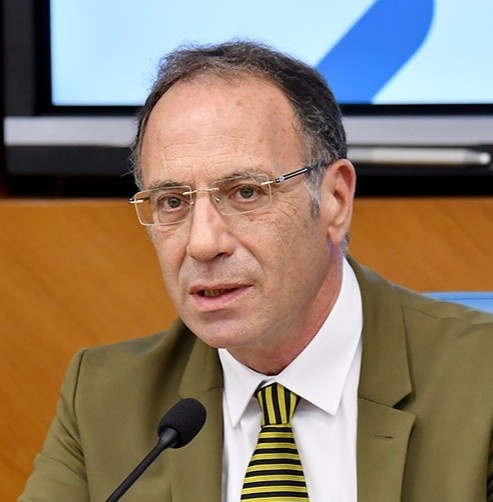Four New Volumes Outlining the Economy of the Future State of Palestine
"The Economic Path to Independence and Peace" - Four New Volumes Outlining the Economy of the Future State of Palestine
New MAS Research Publication: A Postwar Economic Roadmap for Palestine
Prime Minister Mohammad Mustafa comments: "The publication, with its comprehensive vision, contributes to the scientific and institutional community's efforts to consolidate governance and economy across the country."
Ramallah, October 8, 2025
The Palestine Economic Policy Research Institute (MAS) has today released a new series of four interrelated research volumes that explore the strategic economic implications of Israel’s genocidal war on Gaza and its broader impact on the overall Palestinian reality—particularly on the project of statehood. This Series was developed within a conceptual framework developed during the early stages of the aggression, and under the overarching theme “The Economic Path Toward Independence and Peace,” in close coordination with the Department of Economic Affairs of the Palestine Liberation Organization (PLO).
These genuine studies aim to contribute to Palestine’s national preparedness to face the policy and economic challenges of the postwar phase, focusing on shaping an independent Palestinian vision for future economic relations—both domestically and regionally. The Institute accomplished this mission thanks to a grant from the Arab Fund for Economic and Social Development, which enabled it to implement the research project according to the highest scientific standards.
The series is based on the premise that a path toward building the Palestinian state may emerge from the ruins of the war on Gaza, based on the commitments stated by the international community at the outset of this historic phase. Yet, the realization of that path requires a genuine political partner willing and capable of engaging in a process that ensures the Palestinian people’s right to self-determination within a fully sovereign independent state—an aspiration that, three decades after Oslo and two years into a devastating war, seems more distant than ever.
Although a team of leading Palestinian economists developed these studies in 2024, MAS Institute decided to postpone publication until a more appropriate political moment to highlights its importance to policymakers and national institutions. The authors have projected in their research the signs of an uncertain future, within one of the darkest periods of genocide the Palestinian people faced, and they took the responsibility of thinking about the post-catastrophe period, guided by hope, resilience, and the determination to reclaim sovereignty and rebuild the state.
 |
Palestinian Prime Minister Welcomes the “Distinctive National Effort” |
In a message addressed to the Institute’s Director General, Prime Minister Dr. Mohammad Mustafa expressed his deep appreciation to MAS and its research team for what he described as a “strategic national effort that meets the demands of the moment and anticipates its challenges.” The Prime Minister stated: “These studies, with their forward-looking vision and scientific analysis, constitute a strategic contribution to enhancing Palestinian readiness for the post-war phase and they provide a solid foundation for shaping coherent national economic policies rooted in the interests and rights of the Palestinian people, and define the future economic relations with neighboring and regional countries from an independent and effective Palestinian perspective.”
The Prime Minister added: “Despite the immense humanitarian, political, and economic challenges confronting our people, the State of Palestine, through all its institutions, stands ready to assume full responsibility across all parts of the Palestinian territories—foremost in Gaza, where the government holds legal jurisdiction and international recognition. We are working with all our will and capacity to strengthen the ability of our institutions to respond to the upcoming stage, including relief, reconstruction, and economic recovery based on a comprehensive national vision that stems from our inherent right to self-determination and independent state.”
The Prime Minister emphasized in his message that “The realization of the Palestinian state cannot be achieved without reunifying geography, institutions, and the national economy under an exclusive Palestinian administration. He affirmed that Gaza is an integral part of the unified, sovereign State of Palestine, and that the national responsibility for its reconstruction will serve as a true test of the ability of the state of Palestine to fully run its affairs through unity and national commitment. He added that “These MAS publications, within a comprehensive vision, represent a vital contribution to the scientific and institutional preparedness for unifying governance and economic systems across the homeland—enabling the State of Palestine to stand on solid foundations in Gaza, the West Bank, and Jerusalem, within an integrated context that rejects division, guardianship, or temporary substitutes.”
 |
Raja Khalidi: “An Advanced Economic Vision of the State of Palestine in Line with a Palestinian Perspective for Our Future” |
As this publication is produced, the ongoing brutal war on Gaza and all of Palestine remains at its peak—marked by mass famine, systematic destruction and murder that tantamount to ethnic cleansing, amid a shameful international silence and clear absence of accountability. In this context, MAS Director General Raja Khalidi stated: “The extremist Israeli government continues to take power with impunity since there is no accountability by the international community. Yet, the political developments of mid-2025—most notably the New York Declaration of July on the two-state solution, followed by a wave of recognitions of the State of Palestine by major countries—affirm that these studies are now more essential reading for all who believe in the necessity of establishing an independent, sovereign Palestinian state.”
The four studies are based on a coherent analytical framework rooted in the national goal of establishing the State of Palestine on the entirety of the territory occupied in 1967, without division, and without separate tracks for Gaza and the rest of the State, whether at governance or economic level. The themes of the series are distributed as follows:
- Volume One: Addresses the economic requirements of the “state-building” phase, a transitional phase (for two to three years) dedicated to restoring normal economic relations with Israel in preparation for the permanent status.
- Volume Two: Proposes a model for a permanent economic agreement that safeguards the sovereign economic rights of the Palestinian people and establishes a balanced relationship with Israel, drawing lessons from past experiences and international economic initiatives since 1947 to present.
- Volume Three: Explores the theoretical and practical foundations, and public policy measures, required to reunify the fragmented Palestinian economy after decades of forced separation.
- Volume Four: Focuses on principles, operational mechanisms, and comparative best international experiences in the field of postwar reconstruction, tailored to Palestine’s specific context.
Khaldi added: “MAS is proud to have been entrusted with this national task at a defining moment in Palestine’s history. In these studies, we aimed to present an advanced economic vision of the State of Palestine, as we the Palestinians envision our future. Therefore, any future negotiations concerning statehood, Gaza reconstruction, administration, and the comprehensive national development strategies should be grounded on the visions and proposals in this series, rooted in the unity and independence of the Palestinian national economy.”

